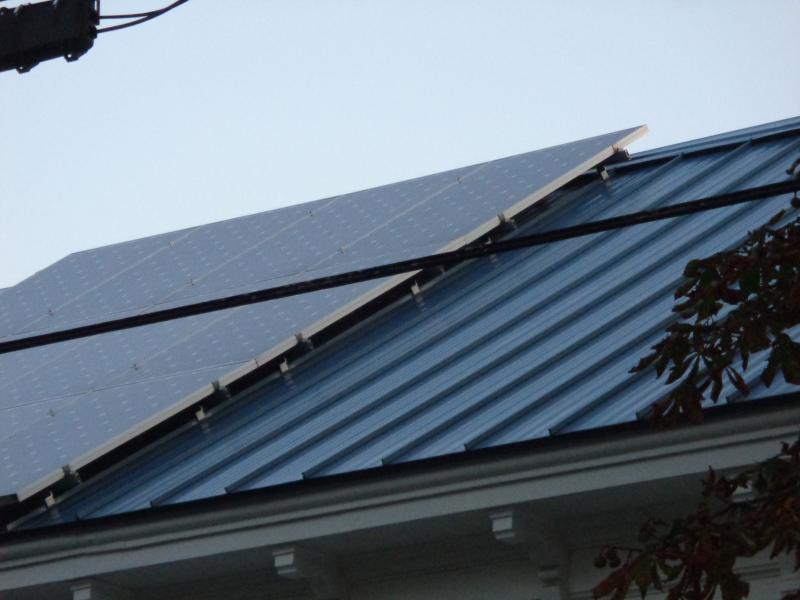ROCKLAND – After firefighters extinguished a blaze in Rockland two months ago, eyes occasionally turned toward a nearby roof. The structure was not in the line of fire. Rather, it contained a modern element with a potential hazard to responders: attached solar paneling.
The panels are now recognized on a growing list of fire-scene dangers that includes modern building techniques, residue from fire retardant furniture, high-voltage utility wires, automatic-start home backup generators, and pressurized propane tanks.
Regardless of zero, three, or 20 modules in a community, responders are requesting more training than the basics taught in Levels I and II firefighter courses.
Members of the Knox County Firefighters Association received training on photo-voltaic panels six months ago. In Bangor, all four crews of the three fire houses finished their class, taught by Brooks Deputy Fire Chief Hans Albee, two weeks ago.
On November 13, the Knox County Mutual Aid Association will host a discussion at the Camden Fire Station.
These electricity-producing panels cannot be disconnected, unplugged, or turned off. As long as light shines, electricity generates. Even the spotlights on some firetrucks can rev up the system.
Still, responders will not refuse to work such a fire, according to Albee. They will assume the inherent risks associated with the occupation, but with the heightened level of caution regarded for propane tanks, electrical hazards, and flame retardant chemicals.
Typical residential solar modules are rated around 300 watts, Albee said. Groups of modules operate between 350 to 450 volts in ordinary conditions, though power output varies with sun conditions.
“We were trying to be proactive,” said Bangor Asst. Chief Matthew Costello.
Though Bangor has yet to have a fire involving the panels, Costello became aware of the risks a couple of years ago. Ever since, more and more interest in alternative energy and discussions generated within Bangor’s code enforcement office have lead to deeper concern.
A tarp thrown over panels may reduce the energy production. That, however, is not a complete, if always viable, solution. Roofs covering structure fires often need ventilation. Axes and picks need to be drilled through the roof. But if the firefighter cannot step on a panel or lay a ladder to get to a good spot, if a pick cannot blindly be forced out from within, other forms of venting must be sought.
Several years ago, a warehouse in New Jersey covered in solar panels burned for 29 hours because responders couldn’t get near to vent the roof, according to Eliot Scott, member of Maine Federation Firefighter’s Association.
Costello pointed out that the rise in new installation may have plateaued anyway, now that rebates have run out.
Albee, in turn, has a more optimistic outlook. “I imagine that some people responded with alarm and fear to the growth of rural electrification in the 1930s, but firefighting techniques adapted, and I don't think anyone now would advocate going back to life without electricity.”
As well as a member of the firefighting community, Albee is a professional design engineer for ReVision Energy.
“Along with ReVision Energy founding partner Fortunat Mueller, who is also a professional engineer and captain for North Yarmouth FD, I have spent the last ten years traveling the state to educate career and volunteer firefighters about how to remain safe on fire scenes where solar energy equipment is present,” Albee said.
They just need to know how to approach a roof system, which adds less than three pounds per square foot to the roof, according to Albee. For comparison, snow load in Maine varies from 50 to more than 90 psf.
Members of the Brooks Fire Department have cellphone apps loaded with information of local residential hazards such as hidden propane tanks. For everyone else, knowledge is only gained upon arrival.
Albee and his Brooks firefighters have already extinguished a fire involving a solar-paneled structure.
For them, arriving on scene meant making note of the panels’ existence, and then avoiding them.
Sarah Thompson can be reached at news@penbaypilot.com



























